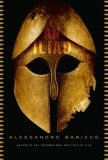
by Alessandro Baricco, translated by Ann Goldstein
Alessandro Baricco re-creates the siege of Troy through the voices of twenty-one Homeric characters in the narrative idiom of our modern imagination. Sacrificing none of Homer’s panoramic scope, Baricco forgoes Homeric detachment and admits us to realms of subjective experience his predecessor never explored. From the return of Chryseis to the burial of Hector, we see through human eyes and feel with human hearts the unforgettable events first recounted almost three thousand years ago—events arranged not by the whims of the gods in this instance but by the dictates of human nature. With Andromache, Patroclus, Priam, and the rest, we are privy to the ghastly confusion of battle, the clamor of princely councils, the intimacies of the bedchamber—until finally only a blind poet is left to recount, secondhand, the awful fall of Ilium.
"Starred Review. In an afterword, Baricco states that "this is not an ordinary time to read the Iliad," and his book is more than a pasteurized version of a great poem. It is a variation, and a very moving one, on timeless Homeric themes." - PW.
"Familiarity with the original text is not essential for successfully experiencing this elegant depiction of warfare--yes, purely it is the story of war, with all the destruction concomitant to that situation; however, the characters achieve a remarkable individuality." - Booklist.
"Unfortunately, these many voices sound alike, so Baricco missed an opportunity to truly reimagine The Iliad; the passages he's added - which are noted in italics - are some of the most powerful moments in this book and make the reader wish he'd been a little less reverent with Homer's masterpiece." - Library Journal.
"Obviously, something is lost in omitting the gods' intercessions, which vary the content and pace of Homer's immortal original, making it far more than a catalogue of battlefield exploits. But Baricco describes such actions superbly, and creates a persuasive atmosphere of character-driven impending doom." - Kirkus Reviews.
"Baricco's text lingers on the futility of an unending war, and casts the arrival of the thousand-odd ships as an invasion by an overwhelmingly superior force, met by young recruits throwing stones." - The New Yorker.
"For all those curious about The Iliad but intimidated by its heft, Baricco’s book offers a swift, stylish, summer-reading version of the great epic." - San Francisco Chronicle.
"Baricco divides the tale into a series of monologues by characters both major and minor. The result is compelling, occasionally thrilling." - Entertainment Weekly.
This information about An Iliad was first featured
in "The BookBrowse Review" - BookBrowse's membership magazine, and in our weekly "Publishing This Week" newsletter. Publication information is for the USA, and (unless stated otherwise) represents the first print edition. The reviews are necessarily limited to those that were available to us ahead of publication. If you are the publisher or author and feel that they do not properly reflect the range of media opinion now available, send us a message with the mainstream reviews that you would like to see added.
Any "Author Information" displayed below reflects the author's biography at the time this particular book was published.
A reader's view of the importance of 'the gods' in ancient works such as The Iliad will color his or her enjoyment of Baricco's interpretation. For this reviewer, it was a stretch to remove the gods entirely from the telling as it fundamentally changes the point of view of Homer's version - that humanity are mere play-things of the gods (or, in the immortal words of King Lear, "As flies to wanton boys, are we to the gods - They kill us for their sport."). However, it has to be said that Baricco has a point - in removing the "excuse" of the gods it is possible to put a very different and relevant, spin on this ancient story.




Any activity becomes creative when the doer cares about doing it right, or better.
Click Here to find out who said this, as well as discovering other famous literary quotes!
Your guide toexceptional books
BookBrowse seeks out and recommends the best in contemporary fiction and nonfiction—books that not only engage and entertain but also deepen our understanding of ourselves and the world around us.